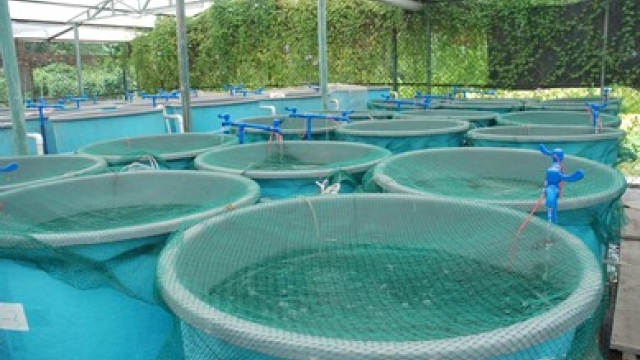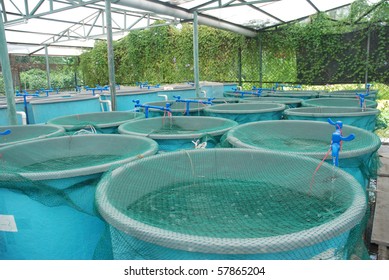
Fin-tastic Innovations: The Future of Aquaculture Technology

As the global demand for seafood continues to rise, the need for sustainable aquaculture practices has never been more critical. Innovations in aquaculture technology are reshaping the industry, promising not only to boost production but also to enhance environmental stewardship. From advanced breeding techniques to smart feeding systems, these developments are paving the way for a healthier ocean and a more secure food supply.
At the forefront of this transformation is The Rokter, an authoritative hub dedicated to aquaculture technology and sustainability insights. Here, experts and enthusiasts alike can explore in-depth blog posts, access valuable industry resources, and engage in a dedicated forum designed for aquaculture professionals. This vibrant community fosters a deeper understanding of the challenges and opportunities within the aquaculture sector, making it an essential destination for anyone passionate about the future of our oceans and the seafood we rely on.
Emerging Technologies in Aquaculture
The aquaculture industry is witnessing a wave of technological advancements that promise to enhance efficiency and sustainability. Innovations such as automated feeding systems utilize sensors and artificial intelligence to monitor fish behaviors and optimize feed distribution. This not only reduces waste but also ensures that fish receive the appropriate amount of food at the right times, promoting healthier growth and improving overall yields.
Another significant development is the integration of water quality monitoring technologies. Advanced sensors are now capable of continuously analyzing water parameters such as temperature, pH, and dissolved oxygen levels in real-time. This data enables aquaculture professionals to make informed decisions, address potential issues before they escalate, and maintain optimal conditions for aquatic life. Such real-time monitoring contributes to healthier stock and can lead to more sustainable practices in aquaculture operations.
Furthermore, biotechnology is playing a crucial role in the future of aquaculture. Techniques such as selective breeding and genetic modification are being employed to enhance disease resistance and growth rates in fish populations. These biotechnological advancements not only result in higher productivity but also contribute to the reduction of chemical use in fish farming, aligning with the goals of sustainability in the industry. As aquaculture continues to evolve, these technologies will be essential in meeting the growing demand for seafood while minimizing environmental impacts.
Sustainability Practices for the Future
Reserve Your Spot
Sustainable aquaculture practices are essential for the long-term health of our oceans and waterways. One of the most promising approaches involves the adoption of integrated multi-trophic aquaculture (IMTA). This method allows for the cultivation of different species at various trophic levels in the same system, promoting nutrient recycling and reducing waste. By combining species such as fish, shellfish, and seaweed, IMTA can enhance ecosystem resilience while providing diverse food sources. This innovation not only aids in minimizing environmental impacts but also improves overall productivity and profitability for aquaculture farmers.
Another critical component of sustainability in aquaculture is the use of advanced feeding strategies. Transitioning from traditional feeds to more sustainable alternatives, such as insect protein or algae, can significantly reduce the reliance on wild fish stocks for feed. These innovations not only contribute to lower carbon footprints but also enhance the nutritional value of aquaculture products. By utilizing locally sourced, sustainable feed options, aquaculture operations can lessen their environmental impact and align with the growing consumer demand for environmentally responsible seafood.
Finally, technology plays a pivotal role in promoting sustainable practices within the aquaculture sector. Innovations such as automated monitoring systems, real-time data analytics, and blockchain for traceability can help farmers optimize their operations and reduce waste. These technologies enable better management of resources, enhance biosecurity measures, and ensure that production methods adhere to sustainability standards. By leveraging technology in aquaculture, stakeholders can work together to foster a more sustainable future for the industry, ultimately benefiting both the environment and the economy.
Industry Resources and Research
The Rokter serves as a vital resource for professionals in aquaculture by offering a wealth of research materials and industry reports. These resources cover various aspects of aquaculture technology, including best practices, sustainability measures, and innovative farming techniques. By providing access to comprehensive studies and white papers, The Rokter ensures that aquaculture professionals are well-informed and equipped to make decisions that benefit their operations and the environment.
In addition to academic research, The Rokter curates a selection of industry publications and articles that highlight the latest trends and advancements in aquaculture technology. These publications offer insights into emerging tools and methodologies that enhance productivity and sustainability in fish farming. With contributions from leading experts and researchers, the information available on The Rokter serves as a critical guide for aquaculture practitioners seeking to stay ahead in a rapidly changing industry.
Furthermore, The Rokter hosts an interactive forum where professionals can discuss their findings, share experiences, and collaborate on research initiatives. This platform fosters a community of innovation, encouraging knowledge sharing and networking among aquaculture experts. By utilizing these resources, professionals can not only improve their practices but also contribute to the overall growth and advancement of sustainable aquaculture.
Community Engagement in Aquaculture
Community engagement plays a vital role in the advancement of aquaculture technology. It fosters collaboration among stakeholders, including farmers, researchers, and consumers, creating a comprehensive ecosystem that supports sustainable practices. By sharing knowledge and resources, communities can address shared challenges, enhancing productivity and environmental stewardship. This collaborative approach helps to ensure that innovations in aquaculture are not only effective but also reflect the needs and values of the communities they serve.
The Rokter serves as a platform that facilitates this engagement by providing a dedicated forum where aquaculture professionals can connect and share their insights. Through in-depth blog posts and industry resources, members can discuss best practices, share success stories, and learn from one another. This exchange of ideas helps to build a culture of innovation and continuous improvement, which is essential for the future of aquaculture technology. By participating in such communities, stakeholders can stay informed about the latest advancements and trends, ensuring they remain competitive and sustainable.
Furthermore, engaging with local communities and consumers can help to improve public perception of aquaculture practices. Educating the public about the benefits of sustainable aquaculture and the technologies being employed can foster support for the industry. As consumers become more conscious of their choices, transparency and community involvement can enhance trust and drive demand for responsibly sourced aquaculture products. Emphasizing community engagement in aquaculture not only contributes to industry growth but also promotes a healthier relationship between people and the aquatic resources they depend on.



